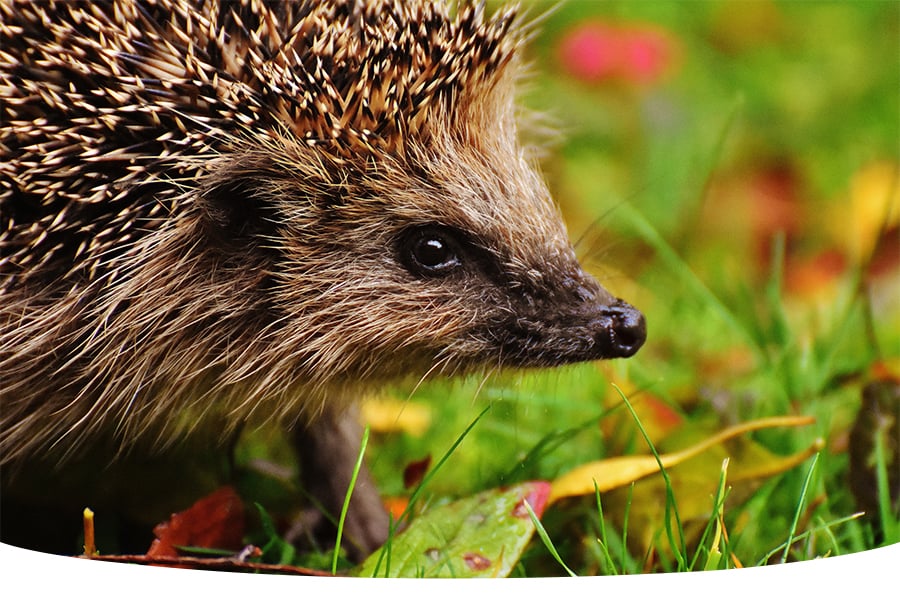7 ways to help garden wildlife this winter

1) Let an area of your garden grow wild
Although we like to keep our gardens neat and tidy most of the year, your local wildlife likes it messy. You can help garden wildlife this winter by leaving some areas of your garden untidy. This is easily achievable by gathering together dead leaves, fallen branches and twigs and piling them up in a corner of your garden. These “messy” areas are a haven for hedgehogs, frogs, and toads, giving them a place to hibernate, stay warm and collect insects for food.
2) Leave some extra food out
Finding food this time of year is tough for your backyard wildlife. Birds especially will struggle to find a natural food source during winter months. But by putting out bird feeders, bird seed and fat balls, you will be helping them keep their energy levels high. It’s advisable to use a range of hanging bird feeders, ground feeders and a variety of bird food and seed types to ensure the different species in your area have something to munch on.
Additionally, many shrubs and hedgerow plants will produce food this time of year also. Plants such as ivy and rowan still provide birds with berries in winter. For this reason, it’s best to delay any pruning or hedge trimming until the last piece of fruit for the year has been eaten.
3) Provide fresh water for wildlife
Most garden ponds and lakes will freeze over at some point during winter, causing your local garden wildlife to struggle to find fresh water. In these situations, you can easily help them by leaving out dishes of fresh water and keeping your bird baths topped up and free of ice. Alternatively, if you have a pond that has frozen over, you can melt a hole in the middle of the ice using a heated saucepan to give animals easy access to drinking water.
4) Provide clear passage for smaller animals
Similar to us, some smaller animals will travel far and wide every night in search of food (and who knows, maybe they do it for the adventure too!). Hedgehogs for example will travel up to 1-mile per night to ensure they have explored every inch of every garden they visit. And this is another area where we can help garden wildlife this winter!
If you want to assist these cute little mammals on their journeys, then it’s easy to do so. The British Hedgehog Preservation Society advises that you create a small 13 x 13cm hole in your garden fence at ground level (either by sawing or drilling). This “archway” allows hedgehogs to easily move to and fro between your garden and what lies beyond.
Taking it a step further, you could add some wildflowers to your garden, especially a wildflower mix that includes meadow grasses. The grasses offer a superb habitat for wildlife in the winter months. And come spring, they will bloom with outstanding colour and diversity.
Adding a wildflower meadow to your garden is easy and helps wildlife throughout the year. Wildflowers feed bugs and pollinators, in turn providing a stable food source for birds and others.
5) Clean birdhouses in these colder months
After the frenzy of spring and summer, birds will have left their houses in need of some TLC. And just like our own houses, they will become uninhabitable if they are left cold, damp and filthy, so it’s important that we help out.
Thankfully, cleaning a birdhouse is easy and it doesn’t take too long to get the interior looking like new again. Also, carefully check there is no one living inside. Once you are sure that it's empty, you can remove all the abandoned nesting material and clean the interior with hot water. Then, dry the interior completely before adding new nesting material. Finally, you can use hay or wood shavings for the bedding, and then you will have a clean nesting area that’s ready for some new inhabitants.
6) Help garden bugs this winter
Most people wouldn’t consider creating a habitat for creepy crawlies. But having insects in your garden, especially in the spring and summer months is beneficial since a lot of them help to pollinate plants, or are a stable food source for birds and small mammals. You can help them out over the winter by providing them with warm, dry shelters. Regardless of whether you choose to use bricks, stone, wood, or a combination of the three, your bug hotel will help them overcome the coldness of winter.
Attract new wildlife to your garden
If you want to go a step further, you can leave out small amounts of food for other mammals that might be passing through:
- Foxes love cheese, boiled potatoes, left-over chicken, bread, and scraps of fatty meat once the sun has gone down.
- Since squirrels do not hibernate, they spend a lot of time over the winter months scavenging for whatever food they can get their little hands on. They adore hazelnuts, walnuts, and almonds, and they also wouldn’t say no to chopped apples, beans, carrots, or a few spinach leaves.
- In the winter months, badgers have a hard time finding their preferred food - earthworms - since the ground is frozen solid. As an alternative to their favourite food, they will happily eat cooked meats, cheese, peanuts, and fruits.
- Finally, hedgehogs like a lot of food that we offer them (with a few exceptions of course). However, their favourites are minced meat, tinned dog food, or cat food but nothing with fish, or scrambled eggs. These prickly little creatures are hardy and know their way about the streets, but you should not leave milk sitting out as it can make them very sick.
The same applies to all wild animals around your local area – leave them out some food but don’t leave large quantities. If you only offer a small amount of food you will be helping them while avoiding them becoming too dependent on your generosity. Likewise, don’t put out food for wild animals if you think they will have to cross a busy road to get to it.
So, if you're wanting to help garden wildlife this winter - simply carry out a few of the suggestions above and your garden regulars will appreciate it.



